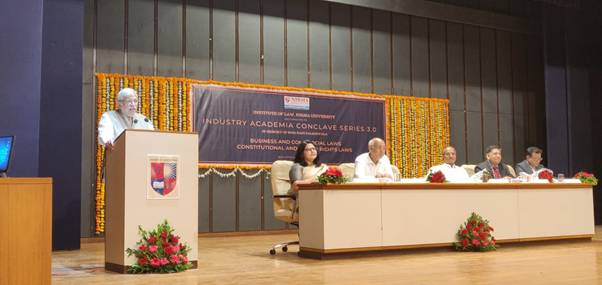ECI to establish a Visiting Chair on Interdisciplinary Approach to Electoral Studies in memory of former CEC Sh T N Seshan
Chair will be mentored by Sh N Gopalaswami Former CEC
CEC Delivers the Keynote Address at Law Conclave at NIRMA University, Ahmedabad
To commemorate and celebrate Sh T N Seshan’s special connect with the young and aspiring India, Election Commission of India has decided to establish and fund a Visiting chair on interdisciplinary approach to Electoral Studies in the Centre for Curriculum Development at India international institute of Democracy and Election Management( IIIDEM ), New Delhi from 2020-2025. The Chair will be mentored by Sh N Gopalaswami Former CEC.
Chief Election Commissioner Sh Sunil Arora today announced this decision while delivering the Keynote address at the Institute of Law, NIRMA University, Ahmedabad. President of NIRMA University, Dr Karsanbhai K Patel, Sh.Umesh Sinha Secretary General ECI, Vice Chancellor-Dr. Anup Singh, Dr Purvi Pokhariyal, Director, Institute of Law, faculty and students were present on the occasion. Sh Arora had been invited by the University on the occasion of Law Conclave organized in memory of the legendary Constitutional expert, economist and jurist par excellence Shri Nani Palkhiwala.
Speaking on the occasion Sh Arora said “Sh T N Seshan’s enduring contribution to the cause of probity, transparency and integrity in various aspects of the electoral process in India has made his name synonymous with electoral best practices worldwide. In his memory thus ECI would establish the Chair. It shall be our endeavour to ensure that the Chair becomes fully functional during the next academic session August- September, 2020.” The detailed modalities of the establishment of the Chair shall be worked out by Sh. Umesh Sinha, Secretary General, Sh. Dharmendra Sharma, DG IIIDEM and Mona Sreenivas, Director ECI and will be presented to the Commission by March 15, 2020. The Visiting Chair programme will be targeted to young academics with proven track record in fields relatable to electoral studies. The Chair will also be expected to curate one National Level Seminar on specific aspects of Electoral Studies. The Visiting Chair will also supervise designing and development of interdisciplinary curriculum/ modules for further training and research at the IIIDEM.

Delivering his lecture on Electoral law - its evolution and practice in India, Chief Election Commissioner said “Coincidentally, the 70th Anniversary of the adoption of the Constitution of India on 26th November, 1950 is close at hand, affording an opportunity for all of us to deliberate upon the path ahead”.
Sh Arora said “Our Constitution is a living document. In many ways, it is also an evolving document which has endured the test of times. From its very inception, the Constitution has spelt, for each and every Indian, a vocabulary of rights, entitlements, duties as well as the trinity of equality, freedom and dignity which make life meaningful” CEC said. The Election commission, like any institution, has to constantly reinvent itself in order to confront new and emerging challenges”, CEC stated.
Shri Arora said “The electoral journey has been remarkable. Yet we cannot sit on past laurels. The Commission is committed to bring more reforms to ensure that the process become more in sync with the times, the current technologies and enhanced voter participation. Recently, the concept of Absentee voters has been made part of our process. We hope to have more than one qualifying dates for eligibility of voters. We have large number of overseas population and we need to devise a mechanism to facilitate their participation in the electoral process. We also need to work harder to curb the menace of money power, misinformation and to check the criminal elements in the arena of elections.” He added that “the roots of democracy run deep in our consciousness. So does an inherent sense of what constitutes right and wrong. Given this, I can say with conviction that the voter of this country is no longer naïve, passive recipient in the play of political democracy. Despite the fact that voting is not compulsory, more than 67% people come out to vote especially the women, senior citizens and persons with disability. “The strength lies in “We the People”. It is the collective power of the People that is invoked through the Constitution” Sh Arora emphasized.
SBS